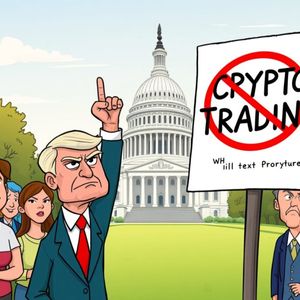BitcoinWorld Urgent: U.S. Politician Crypto Trading Ban Proposed to Combat Corruption The world of cryptocurrency is constantly evolving, bringing with it new opportunities and, sometimes, new ethical dilemmas. A significant legislative move is now on the horizon that could redefine how U.S. politicians interact with digital assets. U.S. Representative Ro Khanna of California is poised to introduce a crucial bill aimed at implementing a politician crypto trading ban , specifically targeting the president, their immediate family, and members of Congress. This proposal stems from concerns over perceived corruption and the unprecedented accumulation of wealth by those in power, sparking a vital conversation about transparency and public trust. Why an Urgent Politician Crypto Trading Ban is Needed? Representative Khanna’s rationale for this proposed legislation is straightforward yet powerful. He has publicly stated that a sitting president is allegedly enriching themselves and their family through an unprecedented accumulation of wealth, describing this situation as “corruption happening in plain sight.” This sentiment echoes a broader public concern about potential conflicts of interest when elected officials and their close relatives engage in financial markets, especially highly volatile and rapidly growing sectors like cryptocurrency. Ethical Concerns: The core issue revolves around preventing politicians from using their privileged information or influence to gain an unfair advantage in financial markets. Public Trust: Such a ban aims to restore and maintain public confidence in the integrity of government officials. Precedent: While not identical, debates around stock trading by politicians have been ongoing, setting a precedent for discussions on financial restrictions. What Could a Politician Crypto Trading Ban Entail? While the specific details of Representative Khanna’s bill have not yet been fully disclosed, its primary objective is clear: to restrict or prohibit cryptocurrency trading by key political figures. This would likely include a comprehensive approach covering: The President: The highest office in the land, where any financial dealings could be scrutinized heavily. The President’s Family: Extending the ban to immediate family members to prevent indirect enrichment or conflicts of interest. Members of Congress: All elected representatives and senators, who are privy to sensitive information that could impact markets. The implementation of a politician crypto trading ban could involve various mechanisms, such as mandatory divestment of existing crypto holdings or placing assets into a qualified blind trust. These measures are designed to ensure that personal financial interests do not influence legislative decisions. Navigating the Waters: Challenges and Benefits of a Politician Crypto Trading Ban Introducing a comprehensive politician crypto trading ban is not without its complexities. One significant challenge lies in defining the scope of “family” and ensuring robust enforcement mechanisms. The decentralized and often pseudonymous nature of some cryptocurrencies could also present hurdles in tracking compliance. Moreover, some argue that such bans might discourage talented individuals with financial acumen from entering public service. However, the potential benefits are substantial: Enhanced Transparency: A clear separation between public duty and personal financial gain. Reduced Conflicts of Interest: Preventing situations where a politician might vote on legislation that could directly benefit their crypto portfolio. Fairer Markets: Ensuring that no individual has an unfair informational advantage based on their political position. Strengthened Democracy: Fostering a perception of integrity and impartiality in government. This bill represents a proactive step towards addressing potential ethical breaches in the rapidly expanding digital asset space, reflecting a growing awareness among lawmakers of the unique challenges posed by cryptocurrency. The Path Forward for Political Ethics and Digital Assets The proposed politician crypto trading ban by Representative Khanna is more than just a legislative proposal; it’s a statement about the evolving standards of political ethics in the digital age. As cryptocurrency continues to integrate into the global financial system, the need for clear guidelines for public servants becomes increasingly critical. This bill aims to set a new precedent, ensuring that those who govern prioritize public service above personal financial gain, thereby bolstering trust in the democratic process. FAQs Q1: Who is U.S. Representative Ro Khanna? A1: Ro Khanna is a Democratic U.S. Representative for California’s 17th congressional district. He is known for his progressive stance on technology and economic issues. Q2: Why is a politician crypto trading ban being proposed now? A2: The proposal comes amid growing concerns about potential conflicts of interest and perceived corruption, with lawmakers engaging in financial trading while holding public office. The rapid growth and volatility of the crypto market have brought these issues into sharper focus. Q3: Which individuals would be affected by this proposed ban? A3: The bill specifically targets the President of the United States, the President’s immediate family, and all members of Congress (both the House of Representatives and the Senate). Q4: How would a politician crypto trading ban be enforced? A4: While details are still emerging, enforcement could involve mandatory divestment of crypto assets, placing assets into qualified blind trusts, or strict disclosure requirements with penalties for non-compliance. These measures would aim to prevent politicians from having direct control over their crypto investments. Q5: Has there been similar legislation for other assets? A5: Yes, there have been ongoing discussions and some existing rules regarding stock trading by members of Congress, such as the STOCK Act . This proposed crypto ban extends similar ethical considerations to the digital asset space. Q6: What are the potential impacts of this bill on the crypto market? A6: The direct impact on the broader crypto market might be limited, as politicians represent a small fraction of overall traders. However, it could signal a more stringent regulatory environment for digital assets, potentially influencing future legislation and institutional adoption. If you found this insight into the proposed politician crypto trading ban informative, consider sharing it with your network! Your support helps us keep the conversation on transparency and ethical governance alive in the digital age. To learn more about the latest crypto market trends, explore our article on key developments shaping digital asset institutional adoption. This post Urgent: U.S. Politician Crypto Trading Ban Proposed to Combat Corruption first appeared on BitcoinWorld .
















